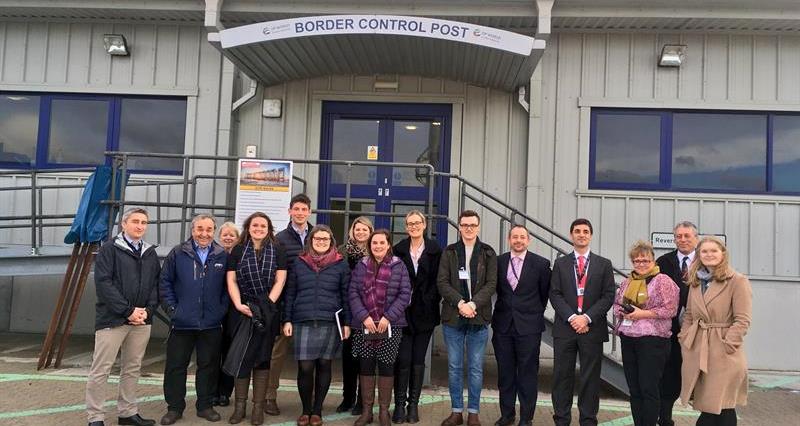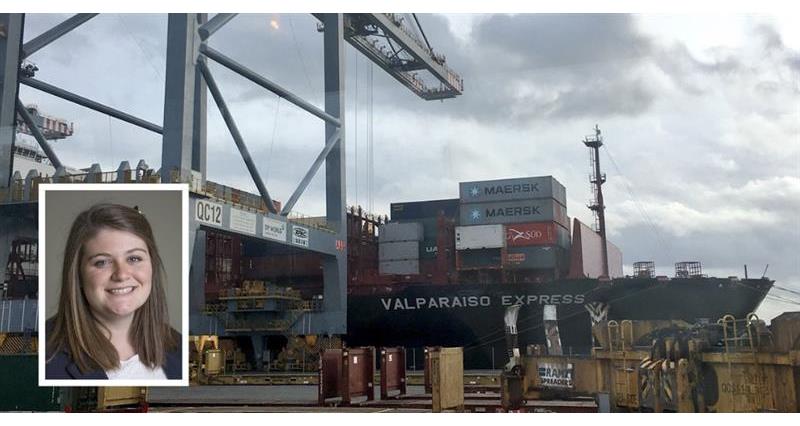During the Brexit debate the checks and balances in place at our borders have come into sharp focus. With that in mind the NFU decided to undertake a fact finding mission to a port in order to understand more about the process of importing and exporting animal products and to hear first-hand from those operating the border day in day out.
London Gateway port is a 220 acre deep water port in Essex on the north bank of the Thames, it currently has 3 deep water berths each 17m deep and has 22 weekly shipping services operating across the globe. The Port is containerised (meaning it deals in shipping containers) and by utilising the UK’s largest tidal channel up the Thames it is able to accommodate some of the world’s biggest ships, some up to 11 containers high. The port opened in 2013 and this year they achieved their 1 millionth container (20ft size). While we were visiting the Port was unloading its first weekly service from Asia which contained 20,000 shipping containers; it was astonishing to see the sheer scale of operations and to move this cargo huge cranes are used, they have a boom able to span the width of 25 containers and can move multiple units at a time.
We were lucky enough to visit the port’s Border Inspection Post (BIP), these are few and far between and the state of the art facility at London Gateway took 18 months to build and cost the private investors a considerable amount. It this facility that imports of animal based products from third countries (those outside the EU) must pass through in order to be inspected, verified and if necessary physically checked. Currently under EU rules Port Health undertakes physical checks (as standard) on 20% of red meat (including pork) products and 50% of poultry products but the likelihood of a product being checked will depend on a number of factors including its origin and the type of product. Much of the process relies on the relevant paperwork being filled in and submitted in advance, this way the port know before the ship docks which containers need checking. For example imports of animals or animal based products – which can be everything from a block of cheese to dried egg fried rice, need to travel with export health certificates signed off by a vet in the source country and if these are not available the product could be rejected. It’s worth highlighting that the highly trained team operating the BIP were largely non-UK and all seven of the BIP’s vets were EU nationals, as such labour availability post Brexit is an acute concern

NFU, NFU Cymru, IMTA (International Meat Trade Association) and London Gateway staff pictured outside the BIP
Brexit poses a unique challenge for a port like London Gateway. In order to operate an efficient port they need to be able to anticipate the volume of trade in order to allocate resource (people, cranes, ship landing space etc), with such carefully managed and slick process even the tiniest delay can cause the system and with it hundreds of lorries and ships, to start backing up. Currently for a product to cross the UK / EU border it only needs a commercial invoice, if we leave the EU without a deal the volume of paperwork and checks needed could dramatically increase putting places like London Gateway under significant pressure. The Port estimate that Brexit could increase their workload by 25%, but contingency planning comes at a cost.
Contingency planning isn’t the only thing that costs, as a commercial business the Port essentially operates a ‘pay to park’ procedure; meaning that if lorries or ships are held up at the port (for whatever reason) they will be charged. The Port Health team also work on a cost recovery basis, so if the number of products needed to be checked, or if the staff are required to work longer hours to keep up with demand, so does the cost.
The operation we saw at London Gateway was overwhelmingly efficient with every operation timed to the minute. I thought it was abundantly clear that the media stories about the delays at the border resulting from a ‘no deal Brexit’ are not horror stories, but are in fact the sobering reality of what would inevitably happen. The UK Agriculture industry is a global operation which relies on product being exported and imported 247 365 days a year. Anything which disrupts or delays will add extra cost and whilst initially borne by the importer it will undoubtedly filter back down the supply chain with a proportion landing at the farm gate. As such the NFU will be lobbying to ensure that throughout the Brexit process UK farmers are not disadvantaged and can continue to play their part in the global marketplace.
